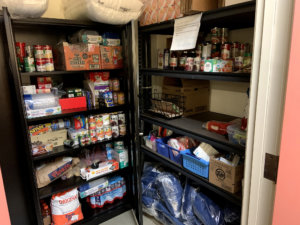This content block does not have a preview.
“We won’t leave any person behind.”
— Tate Waggoner
Veterans know how to face adversity. To protect one another, and their country, they use teamwork, grit, discipline and careful preparation. During the COVID-19 pandemic, the Central City Concern Veteran’s Grant and Per Diem program is mustering those resources, and more, to safeguard their clients.
“We won’t leave any person behind,” said Tate Waggoner, the team’s lead case manager and a career member of the U.S. Air Force. “We’re ready for this.”

The CCC Veteran’s Grant and Per Diem Program is run by a small team, but a passionate one. From left: Carmen Young, Kim Pettina, Tate Waggoner (standing), Justin Lupin and Nicholas Walker. Not pictured: Michaelle Robardey, Brandon Swaney and Lisa Watson.
The Veteran’s Grant and Per Diem program (GPD), a partnership between CCC and the Veterans Administration, works to connect veterans who are homeless or at risk of becoming homeless with housing, health care and employment. The eight-person team — composed of case managers, peer support specialists, housing specialists and employment specialists — empowers clients to reclaim control of their lives and obtain self-sufficiency. Right now, a large part of their work is supporting clients during the COVID-19 pandemic.
“We’re all in survival mode,” said case manager Kim Pettina, who has worked with veterans for more than 20 years.
Many GPD clients are senior citizens, and many have chronic illnesses or physical disabilities. More than half are immunocompromised and therefore vulnerable to COVID-19 complications. It’s important for them to isolate now, in order to stay safe.
But hunkering down alone can be hard for clients.
“We’ve seen a shift in mental health due to all this isolation,” said Pettina. During the COVID-19 pandemic, she has worked primarily from home. Her communication with clients is now via phone instead of face-to-face.
Personal visits from team members who are still able to work on site make a difference. Carmen Young, a peer support specialist, knows that when she drops off a box of fresh groceries at someone’s door, she might be the only person they see that day. “We talk, and they have so many stories,” she said about that important point of connection. “We’re all learning how to cope and deal with it.”
GPD clients are also protecting one another.

The GPD team assembled an emergency food pantry in their office at CCC’s Martha Washington building in downtown Portland. There’s everything the team would need to support a client through illness, should it come to that. In addition to food and hygiene products, there are cleaning supplies, extra sheets and pillows, laundry bags and more.
Veteran Justin Lupin, a GPD case manager, has seen how clients who usually keep to themselves are showing mutual support. Neighbors have been cooking for one another and pooling resources. One day, he bumped into a client who was heading down the hallway with a bowlful of dinner for another veteran.
“It’s a real community,” Lupin said.
Lisa Watson, GPD Program Manager and a veteran, said that sense of community comes from a military mindset.
“When we meet, we have something in common right from the start,” she said. “And we bond fast, because you never know how long someone is going to be in your life … or how they’ll need to protect you.”
Despite the current climate, the GPD team’s work has continued. Lupin has placed 12 clients into housing since the pandemic began. The team continues to drive clients to essential medical appointments, albeit with a new disinfection protocol before and after each trip. And Young described networking with other peer support specialists to track local resources for daily fresh food donations.